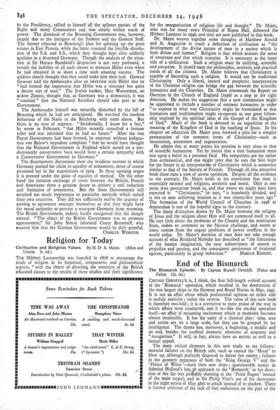Religion for Today
THE Hibbert Lectureship was founded in 1878 to encourage the study of religion in its historical, comparative and philosophical aspects, " with the object of directing the attention of the British educated classes to the results of these studies and their significance
for the reorganisation of religious life and thought." Dr. Major, who was for many years Principal of Ripon Hall, delivered the Hibbert Lectures in 1946, and they are now published in this book. Dr. Major weaves together some thoughts of Matthew Arnold and St. Augustine to reach a definition of civilisation as " the development of the divine nature of man in a society which is both divine and human:" Religion is that which arouses the sense of reverence and that which restrains. It is necessary as the inner side of a civilisation. Such a religion must be unifying, scientific and attractive. It should meet the philosophic, aesthetic and practical needs of all the citizens. Dr. Major believes that Christianity is capable of becoming such a religion. It would not be traditional Christianity. Only a liberal, inward and prophetic interpretation of the Christian religion can bridge the gap between the scientific humanists and the Churches. Dr. Major commends the Report on Doctrine in the Church of England (1936) as a step in the right direction. He makes the suggestion that a new commission might be appointed to include a number of eminent humanists in order " to explore in what way Christianity might be formulated so that humanists and traditionalists might co-operate as one great fellow- ship inspired by the spiritual ideas of the Gospel of the Kingdom of God." Much of the book is devoted to an exposition of the meaning of the Kingdom of God in the teaching of Jesus.' In his chapter on education Dr. Major puts forward a plea for a simpler presentation of the common terms of Christianity—such as incarnation, atonement and regeneration.
He admits that at many points his position is very close to that of scientific humanism. Yet he insists that a true humanism must rest upon a belief in a personal God. His sympathies are lay rather than ecclesiastical, and one might infer that he sees the best hope for the future in an interpretation of Christianity which is somewhat similar to that of the Society of Friends. Through all this attractive book there runs a note of serene optimism. Despite all the evidence to the contrary, Dr. Major holds to his conviction that man is essentially rational and religious, aesthetic and moral. Only at one point does pessimism break in, and that where we might least have expected it. "Christianity," he says, "is hopelessly divided, and is not so near achieving reunion as it was twenty-five years ago." The formation of the World Council of Churches in 1948 at Amsterdam is one of the hopeful signs to the contrary.
The sharp distinction drawn by Dr. Major between the religion of Jesus and the religion about Him will not commend itself to all. He says little about the problems of the Church and the totalitarian State, makes no comment on the Marxist challenge, and seems at times remote from the urgent problems of power conflicts in the world today. Dr. Major's doctrine of man does not take enough account of what Reinhold Niebuhr has described as " the limitations of the human imagination, the easy subservience of reason to prejudice and passion, and the consequent persistence of irrational
egoism, particularly in group behaviour." MARCUS KNIGHT.


































 Previous page
Previous page